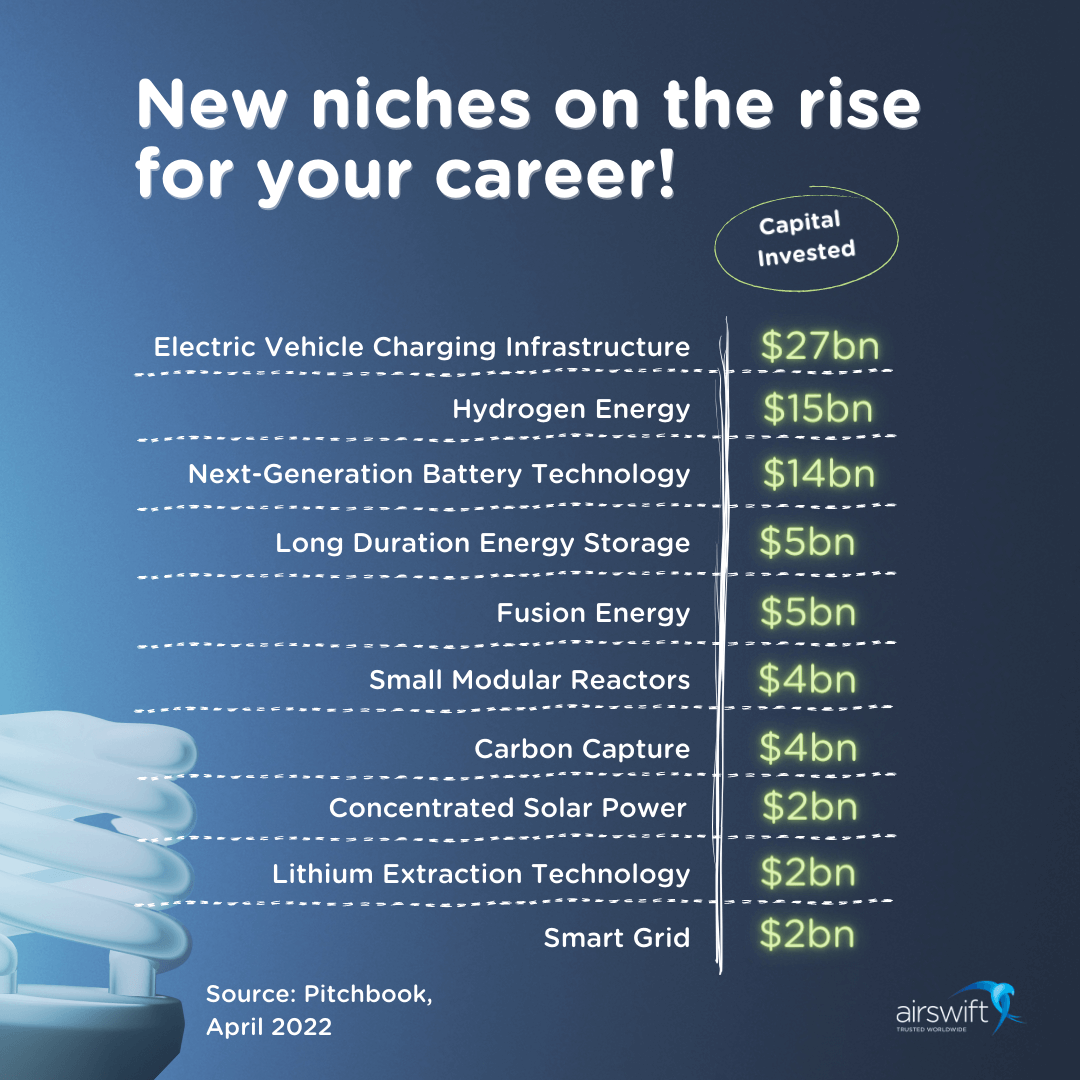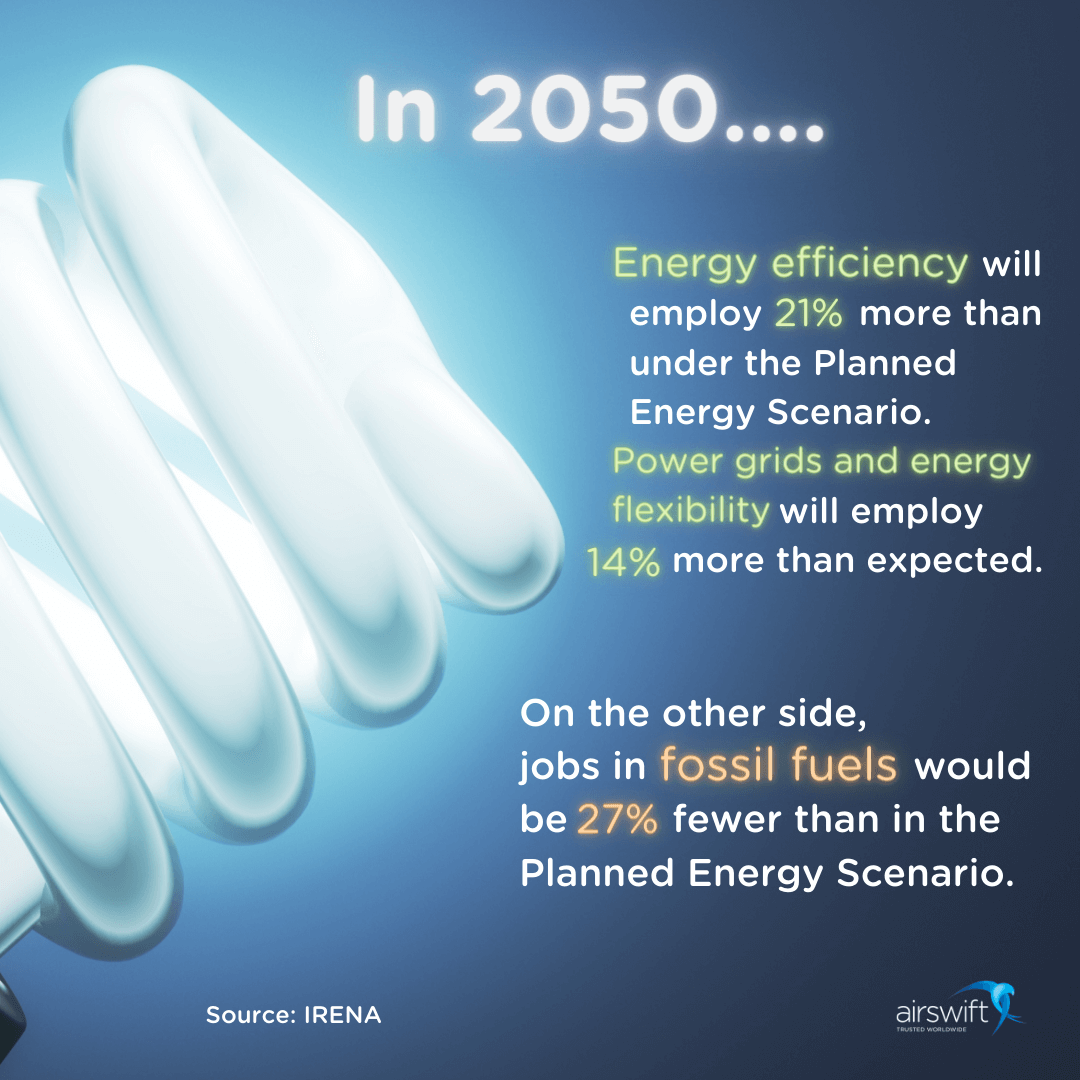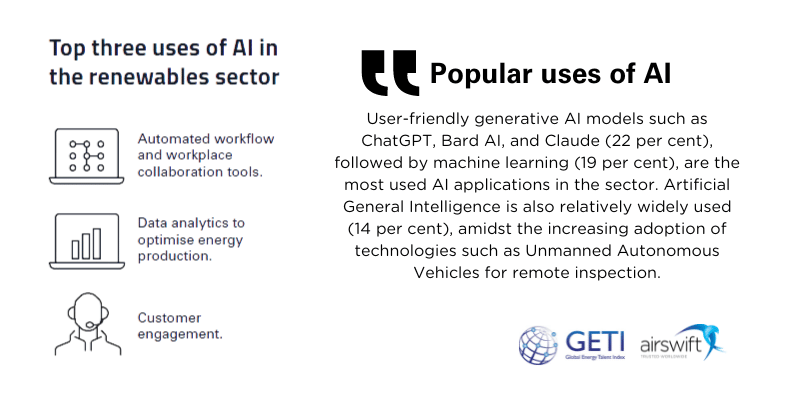
By
Raphael Santos
February 16, 2024
Updated
June 26, 2025
Technology is everywhere and the energy industry won’t be left out
With a bright future ahead, the renewables sector has no shortage of excellent pathways for jobseekers looking to enter the clean energy market.
The public agenda to decarbonise the planet by 2050 has been encouraging innovation across cleantech and climate tech. An abundance of investments has also ended up generating new jobs in the renewable energy sector.
And the current situation in the clean energy market could not be more encouraging. The International Energy Agency (IEA) reported that global employment in energy has now surpassed pre-pandemic levels.
So prepare your resume, because energy is definitely a good career path! Businesses are going through an energy transition and are looking for more tech skilled workers. The demand for tech talent only tends to increase, and as-a-result, the energy market has everything to be one of the highest-paid in the entire industry.
The energy sectors are purely tech now
Today's energy career is a technology career (and vice versa). Both areas seem to be the best combination for those who want to build a professional journey with purpose and disruptive innovation.
Energy sector jobs are not just about drilling wells, selling gas or running power plants. They require knowledge of science, engineering, finance, operations, marketing, sales, HR, IT and more. The list goes on.
Tech companies have been investing heavily in energy-related technologies for years now. This has led to an increase in demand for skilled professionals in this area.
What careers deal with energy?
Remember the mantra: tech is everywhere now. This means that the energy industry is more than ever, in need of software engineers, data scientists, cloud architects and more.
It is imperative to understand how the energy industry constantly demands automation and digitisation. Therefore, for professionals pursuing career opportunities in this field, the demand and value for the following skills will only continue to grow:
- Data Sorting
- Data Cleaning
- Computer Science Fundamentals and Programming
- Neural Networks
- Natural Language Processing
- Cloud Security
We are seeing the energy industry undergo a digital transformation. Companies are creating solutions through their efforts in digital design, data analysis and automation.
Emerging markets can also be your gateway to energy
Many employment opportunities are appearing in emerging markets such as Russia, Serbia, Turkey, China, Indonesia, Brazil, India, Egypt and others.
Asia appears as the main region offering such opportunities. In East Asia and the Pacific alone, nearly half of the total direct green jobs are expected to be created among these markets in the next decade.
%20(1)%20(1).png?width=1080&height=1080&name=Green%20employment%20opportunities%20in%20emerging%20markets%20across%20key%20sectors%20between%202020%20and%202030%2c%20by%20region%20(in%20millions)%20(1)%20(1).png)
Demand drives growth. One of the factors driving this growth is an increase in demand for certain resources found abundantly in some parts of the world, including India (nickel), China (lithium), and Australia (copper).
Renewable technologies are an open sea of opportunities
The best way to anticipate market trends and improve your skills to remain competitive in this new energy industry is to identify emerging niches. These growing segments present good opportunities due to the recent increase in investments that has led to numerous job openings.
This is where renewable energy enters the fray. As one of the fastest-growing industries in the world today, it’s estimated that by 2050, renewable energy sources will account for as much as 50% of global electricity generation, according to the U.S. Energy Information Administration (EIA). The demand for clean and sustainable energy has never been greater.
The growth of this industry is being driven by a number of factors including:
1) Growing concern over climate change and its impact on our environment.
2) Increasing awareness about the need to reduce dependence on fossil fuels.
3) Government policies encouraging the use of alternative forms of energy.
4) Increased cost-effectiveness of the intervention.
5) The development of new technologies which make it easier to generate electricity from renewable sources.
Is energy a good career path?
Many niches in clean energy are attracting the spotlight of the market and, consequently, of the investors. Green spaces such as Electric Vehicle Charging Infrastructure (USD $27 billion) and Hydrogen Energy (USD $15 billion) are on the rise and could be the next stop for your career.

Renewables practically dominate all energy sectors due to the global energy transition. Even Oil & Gas companies are following this wind of change; this will open up even more opportunities for professionals coming from green tech.
The world has changed dramatically over the last few decades. The Industrial Revolution was followed by the Information Age, which led to the Digital Revolution. Now we are entering into the Fourth Industrial Revolution, also known as Industry 4.0 or Smart Manufacturing. This revolution will be driven by new technologies such as Artificial Intelligence (AI), Internet of Things (IoT) and Big Data Analytics.
And data and energy are inextricably linked. In fact, they go hand-in-hand. The energy ecosystem has become more digitalised than ever before, and the data that is generated by these new technologies will be used to help us reach net-zero.
A data-driven revolution
The energy industry is going through an unprecedented transformation. It’s no longer just about producing electricity; it’s also about managing the supply chain, optimising operations, improving customer service, and even creating new business models.
This transformation is driven by two trends:
1) The rise of distributed generation (DG)
DG refers to any source of power other than traditional centralised generating plants, such as solar panels or wind turbines. This includes both large-scale projects like utility-scale solar farms and small-scale residential installations.
2) The increasing digitisation of the energy system
Digital technologies have been around for some time now, but their impact on the energy sector has only recently begun to take shape. For example, smart meters allow utilities to monitor consumption patterns and optimise the distribution network. IoT devices can collect real-time data about renewable energy sources and transmit them to the grid operator. And big data analytics can help identify market segments where demand for energy services could be increased.
These trends will continue to accelerate in the years ahead. As the energy industry becomes increasingly digitalised, the need for skilled professionals with deep knowledge of these emerging technologies will increase.
Energy jobs will never stop being in demand
The investments in energy efficiency will continue to grow in alignment with the various agreements between the countries to decarbonise the planet. The Paris Agreement is one of the great motivators behind the energy transition. Today, in both the East and West, you can see renewable energy projects receiving a healthy portion of venture capital funding.
 Source: Frame Stock Footage/Shutterstock
Source: Frame Stock Footage/Shutterstock
Like the entire energy industry, such projects are gaining data-driven characteristics, which increases the demand for data scientists and machine learning engineers. Undoubtedly, it presents a fantastic opportunity to enter a playing field pregnant with job possibilities.
How much are energy jobs in demand?
According to the International Renewable Energy Agency (IRENA), the number of jobs in the energy industry could jump to 100 million by 2050. This is equivalent to more than 72% of what currently exists.

And the most incredible thing is that the supply of renewable energy jobs exceeds the job losses arising from the Oil & Gas industry.
The energy industry is the first stop for engineers
Regarding the work of engineers in the energy industry, we can first divide them into two groups: those linked indirectly and those directly related to its disruption.
What do energy engineers do?
Chemical, electrical and mechanical engineers, for instance, are among the most in-demand jobs in energy. But when we talk about that disruption and the advances developed by new technologies, we see that the future of manufacturing is going through a change. This unique moment will bring more opportunities for tech engineers whose specialisation lies in the emerging Information and Communications Technology (ICT) sector.
 Source: Frame Stock Footage/Shutterstock
Source: Frame Stock Footage/Shutterstock
Within the ICT niche, the robotics area is the most prominent. Drones already make a difference in managing properties and open areas; wind power is becoming more efficient through robotics; data integration has been essential for optimising electricity distribution.
So, robotics and algorithms will keep engineers busy in the future. According to a report by the World Economic Forum, the expectation is that 97 million new jobs will be created with this new integration between humans and machines.
Does the energy industry pay well? Yes, very well in fact
According to this supplement of the annual U.S. Energy & Employment Report (USEER), energy workers receive 34% more than the median U.S. salary. The Oil & Gas sector is still the owner of the biggest salaries. However, Renewables promise a more exciting growth — the Renewable energy sector has on its side the industry trends and the public subsidies.
How do I get a job in the Renewable energy field?
As we have shown, Renewable energy jobs are pretty promising. Our annual Global Energy Talent Index (GETI) report lists the technical skills desired by hiring managers. We also compare those skills with the ones already possessed by professionals.
It is good to study your current skills and see the ones still needed. This way, you can design a career path more aligned with the energy sectors.

You can read our full GETI report and learn more about this industry that will keep growing in the following years.
You must be aware of how you will fit into an industry that has been gaining scale and optimising its efficiency.
Of course, with the current boom in artificial intelligence, many will have the opportunity to embark on this journey and be at the forefront. You must take advantage of the AI boom and prepare yourself to master these technologies within the context of the energy industry.

And before we finish this section, here are more previsions. The tech talent of today will gain notoriety with skills capable of helping in the following activities:
- Collecting data to deliver valuable insights about renewable energy systems.
- Measuring the risks of new types of equipment and the solutions for environmental impacts.
- Supporting energy conservation analysis.
- Designing user-friendly software and data infrastructures.
- Assisting in the collection and analysis of data from the natural environment.
- Developing algorithms for smart grids, which can help reduce power consumption and increase grid stability.
- Analysing the performance of solar panels or wind turbines.
- Optimising the design of a building’s HVAC system.
Most of all, you will be helping to decarbonise the planet. Therefore, all the technological advances driven by the industry and by you will lower the cost of renewables - an auspicious and essential step for the green economy.
How can AI help me find my dream job in energy?
Artificial intelligence (AI) offers a lot of pathways for tech specialists looking to enter the energy sector. However, one particular strategy stands out for its ability to communicate better career advancement: leveraging AI to demonstrate your technical expertise within your resume.
When executed correctly, this approach not only showcases your proficiency but also distinguishes you in a competitive job market.
To facilitate this, we have curated a selection of the finest prompts from our digital library, tailored for use with AI tools such as ChatGPT or Copilot. These prompts are designed to bring AI as your sidekick, empowering you to refine your resume. With that, you'll effectively showcase your technical proficiency and precision to potential employers.
We can help you enter this industry
New sources of energy are being prioritised (wind farms, solar power, etc) and this will only help to attract more and more investments in energy savings. Definitively, energy is an excellent career path and now is the time to make your mark.
We at Airswift have an extensive database of energy industry clients ready to hire skilled professionals. With years of experience in providing workforce solutions, we have more than 60 offices worldwide and over 9,000 contractors.
Sign up for our platform and ensure your resume reaches the best companies in the global energy sector!



